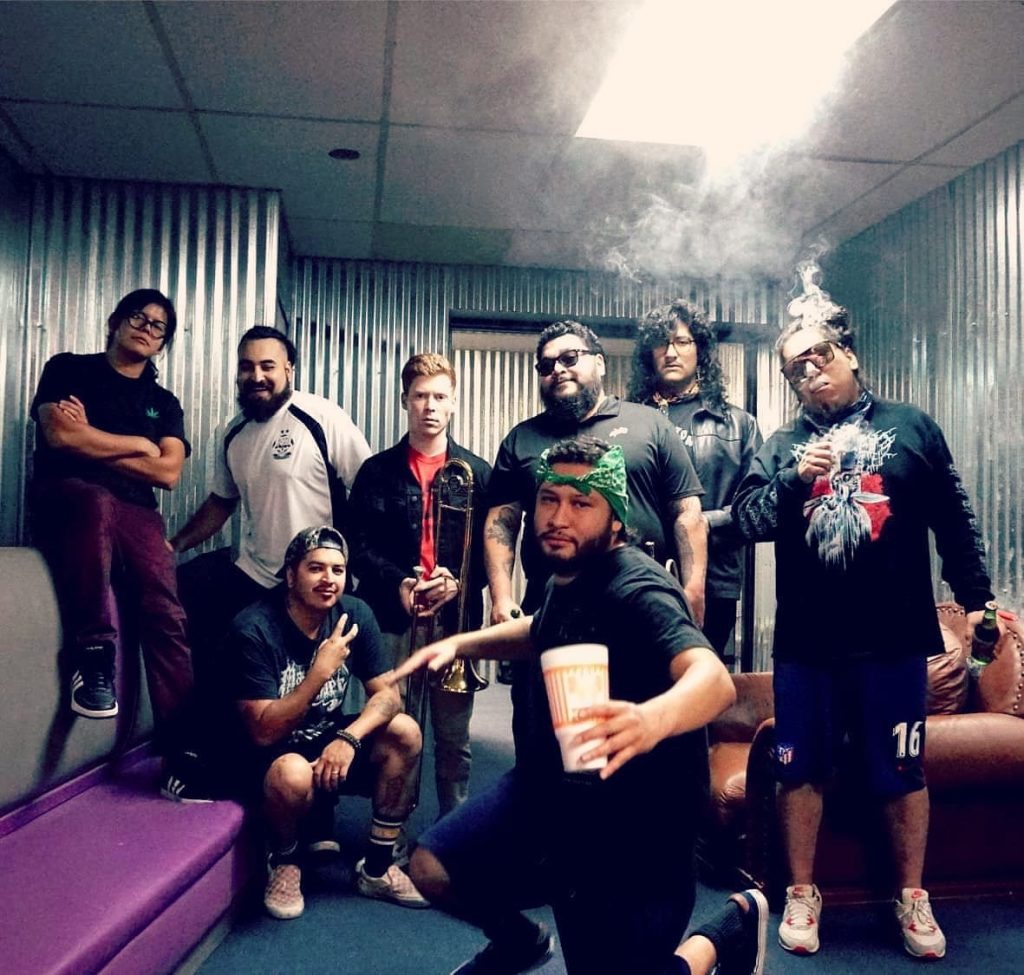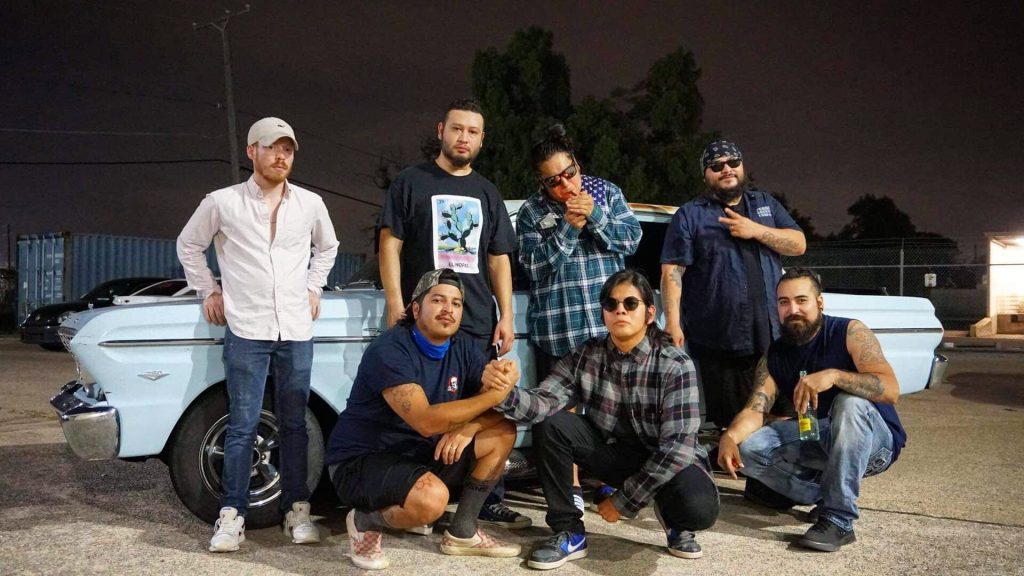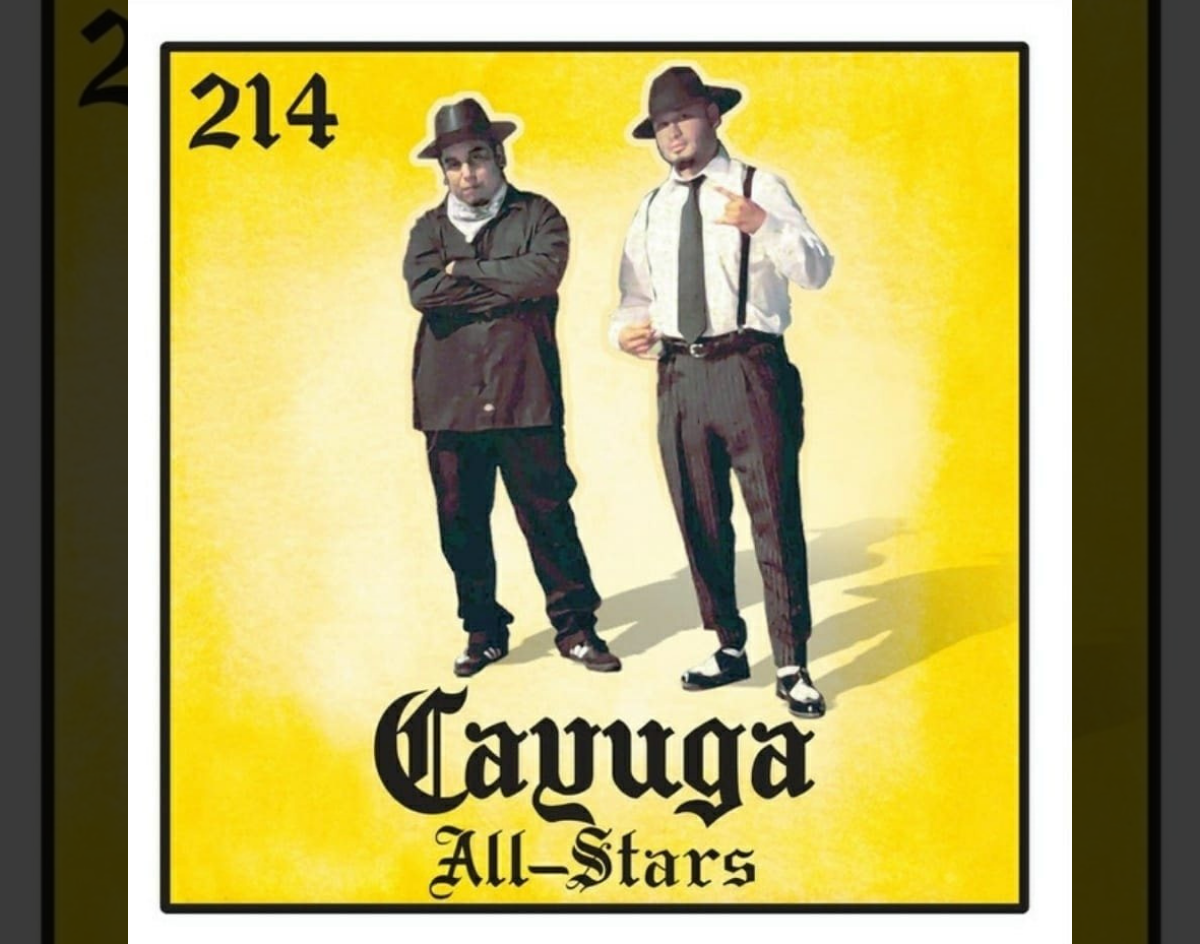Dallas-Based Cumbia Band Cayuga All-Stars Is Comprised Of An Eclectic Group Of Punks And Metalheads Who Went Back To Their Mexican Barrio Roots.
Welcome to Como Somos, a new recurring Central Track series about Latinx music in North Texas. Como Somos, a phrase that translates to “as we are” in Spanish, focuses on the up-and-coming Latinx acts that are heavily inspired by the sounds and roots of their cultural backgrounds. Here, they share their stories of what it means to be a Latinx musician in DFW today, as well as Spanish tracks that helped shape their artistry, to better connect with their ever-growing community.
Since its grand debut in July of 2021, the cumbia sounds of Cayuga All-Stars have echoed down the streets of Deep Ellum and beyond. While the band is fairly new, with its music just hitting digital platforms in March, the members of this exciting group are not at all strangers to the scene.
In fact, the comical boys of Cayuga can’t go to any venue without getting recognized and praised.
Everyone has spent years contributing to the Dallas music scene as honorary members of other diverse bands — totally different from cumbia — and die-hard supporters of local music. So much that even one of them has a yearly music festival named after him.
Two years after forming, Cayuga All-Stars released the first three tracks in its catalog, which still doesn’t compare to the one hell of a party they throw when they perform live. They somehow manage to squeeze eight members on those Deep Ellum stages and still move to the rhythms of its cumbia songs. Even off-stage, they’re the ones who keep it going at every show and kickback they go to until bartenders kick them out.
Cayuga Allstars’ first mixtape 214, a representation of their cultural roots and their love for the city of Dallas, released March 30. 214 was inspired by good vibes and good times, but the band’s message is still louder than their music.
It tells us that cumbia is a Latin language — one they know how to translate with random beats on bar tables and flicking of beer can rings.
Cumbia music, which was influenced by the sounds of Native tribes, originated in Colombia and then spread throughout parts of Latin America — making it one of the most popular styles of music in the Latin community. However, the cumbia half-step beat really traces back to enslaved Africans during the nineteenth century in the Caribbean. The sound of their chained ankles dancing created that original beat.
Now, Latin countries have their own subgenres of cumbia. For example, Peru has chica music — a style of cumbia that combines psychedelic rock — and Mexico has cumbia sonidera, which emphasizes the guacharaca, and norteño cumbia that’s related to ranchera music. Cumbia rebajada, which Cayaga All-Stars were inspired by, is cumbia played at slower tempos. Those are just a few.
For Cayuga All-Stars, there’s no better way to describe their modern cumbia as simply party music. It’s the music that moves you — no matter where you come from.
At every show they perform, you’ll never see the same type of people. As frontman and guitarist Cesar Vargas says, “You’ll see some punks, some thrashers, some darkes, some cholos — from everywhere.”
Before we get into it, let’s begin by name dropping the members that have ultimately shaped Cayuga All-Stars into what it has become — just a bunch of rocker foos making cumbia music.
The band was formed by Vargas, who comes from the band Los Bad Hombrez, and Champ Cantu, percussionist and founder of Champ Fest, during a jam session at Cantus’ house. Vargas’s uncle Oscar Guzman plays trumpet and was once in a Mariachi band.By now, everyone has nicknamed him “Tío” because Cayuga All-Star is really just one big family.
Drummer Adan Egure, from the East Dallas skate-tanic and thrasher band Hoodrat, is from San Luis Potosí, but didn’t grow up listening to traditional Mexican music. His metal drummer father taught him what he knows, but admits that being in Cayuga All-Stars makes him feel like his true self.
Eric Hammer of reggae band The Fullstops, sticks out like a sore thumb, not because he’s the only white, ginger guy in the group, but because he’s one of the most talented trombonists in the area. They have famously nicknamed him “El martillo” for obvious reasons. Alex Mireles, drummer of the award-winning Nawf Dallas flower punk band Sub-Sahara takes over on timbales in Cayuga All-Stars. Finally, bassist and recording engineer Irving Lopez is one of the leading members of the grindcore scene in Dallas and plays for Trucido and Cognizant.
We asked some of the members of Cayuga All-Stars why the hell a bunch of punks started a cumbia band. This is what they had to say.
Who the hell are you guys?
Cesar Vargas: Somos los pinches Cayuga All-Stars de Dallas, Texas. Triple D, baby. When we get on stage that’s pretty much what I say. We’re like party music, we like to get down. We started off with our roots with cumbia and added a little bit of funk, a little lowrider, cholo, whatever — D-Town style.
Oscar Valdez: It’s party music. All we do is party. A bunch of metalheads doing cumbia. Champ is the hub of the music industry here.
Champ Cantu: I’m from Monterrey, born and raised, but I’ve been here for 15 years. I love Dallas – me adoptaron. I’m pretty excited about the band, actually the whole scene is badass. I got so much love for it. We all met in my home. [Cayuga] is my street.

If you guys come from different bands with totally different sounds, how did this cumbia band assemble?
Vargas: We always play punk, metal and even hip hop, but I was like “Fuck it, imma start a different band.” A lot of us cabrones, somos piche ocho gueys. Every time we go out, we always end up dancing cumbias. You know, like, cumbia rebajada. Crunk cumbia really inspired me too. I never really thought about starting a cumbia band, but it’s what I do because at the end of the night people just want to have a good time. We’re just being ourselves. Cumbia is the new rock and roll – or whatever they say. Cumbia is the new punk.
Valdez: We were like an academy before. [former member] Jorge bought a bunch of instruments – about 100 instruments and everyone was just playing around with the stuff. There was maybe two or three of us that were the talented people in the room. I remember Cesar didn’t show up for his birthday during covid and it was up to me to throw it down. I was like, “I can’t let Champ down” so imma show him how to throw it down without Cesar. And we did it. I remember seeing all the members that we were training that whole year throwing it down. Man, I was proud. I was proud of everybody.
Adan Egure: Eventually they started, and I was asked to be in the band, but they still had other people. Once it got serious, we were like, “Alright, let’s make the setup good.”
Valdez: There’s been a lot of interchanging members. If you show us you’re talented, we don’t have to tell you what to do. Just don’t disappoint.
Eric Hammer: All-stars is basically because it’s an all-star band, like all-star basketball or football teams. Basically, we’re the best, coolest, most OG from all the bands.
Dallas has all sorts of acts and musicians playing all over Deep Ellum, but not much Latin music. Many Latin acts play in other parts of Dallas. How did you think the crowd would react watching you play live?
Vargas: The first show we did – we made our own show. The Barrio show. It was a stage behind Churches Chicken and Wicked Ink Tattoo Club. There were like 200 or 150 people there. When we started playing, everybody was dancing with us. It was like, “Yeah, that’s what up. It’s going down in D-Town.” We’re just trying to make you dance. If not, we’ll jump on the floor and dance with y’all.
There’s a whole other world for Spanish music at other bars. They be out there doing their thing. Around [Deep Ellum] it’s diverse, but you don’t really see that many Spanish bands. Our second or third show ever was at Three Links – it was our first time playing there. It was at max capacity, bomberos showed up and people had to go outside. They were telling me that night people from Café Salsera were coming to us because they heard the music. I was like, “Oh, that’s badass.”
There’s a lot of Latino bands but most of them are tribute bands. I wanted to make my own style. We got all got out own style – me and my bandmates. We all come together and create our own style, which I love about playing with them.
Hammer: At the shows, if you’re not dancing we’ll dance with y’all.
Valdez: Do more than the instrument — move.

Does your first drop 214, or your unreleased music, follow any specific themes?
Vargas: Our message is probably just to have a good time. You know, a gozar. Peace and love. Smoke some.
Egure: Weed, alcohol, party.
Hammer: We have a whole song about weed and a whole song about alcohol.
Cantu: The theme is more about the instrumentals. We have a song called “Matrix” and it’s a more serious song. So, we do a little bit of everything
Valdez: “Matrix” is a tribute to a very good friend of our who passed. It doesn’t even have lyrics, so people just start humming the rhythm.
Vargas: I’ve never released anything on digital platforms before. [Me and Oscar] were in Las Vegas when the singles dropped and I had no idea. I was like, “what the fuck, we’re on Spotify.” We were walking around Las Vegas Boulevard dancing to our music. I was like, “Finally, mom, we’re on Spotify.” And my mom doesn’t have Spotify, so then we had to pay for it.
What about cumbia speaks to you the most?
Egure: The fact that we’re Mexican as fuck. Nos vale verga. I feel like we all like to celebrate life as it comes, and music is a big part and we’re trying to do it with everybody.
Valdez: When you work at a restaurant, in the kitchen there’s always cumbia. If it’s any other music, the people just aren’t moving – they’re not feeling it. Cumbia kinda just gives you that rhythm. It’s beyond party music, it’s working music. It’s an everyday thing and now we’re a part of it. If you start moving to it, then we’re doing something.
Cantu: We like to represent our culture, but our music is more from the barrio – las calles. That’s the main thing about us. We love the culture and the fact that we have Eric with is better.
Hammer: I recognize Latin – Colombian and Mexican – cultures as what was pretty much here before us in a way. Therefore, it’s as important as any other culture. The music makes people dance, almost more than any other music. It’s the fact that it’s meant to feel good – that’s why anyone can get behind cumbia.
Vargas: We want to show the world about our culture and remind everybody. It’s always been out there, but show our scene. At the end of the night we want to be dancing cumbia.
What inspire you the most?
Vargas: The whole music scene in Dallas. They show me that’s so much out here that needs to be discovered. All these artists around me. My family, too — our family. They’ve always played music and they showed us a lot of music growing up. Since I was a baby I always wanted to play music. My mom would take me to Deep Ellum when I was a kid to shows.
Egure: For sure my father because he taught me everything I know — he’s a good musician. In reality, what inspires me the most is everybody in the band, the band itself and the hype. When we all play you can feel it. Everybody’s feeling it. [Also] the bandmates — the homies, man, mis carnales. Whenever we’re all together, we just throw it down, party and have a good time.
Hammer: Because of how we we click, it’s mostly how natural and organic things just fell into place.
Valdez: I’ve been playing for a really long time and there’s never been a person like Champ. Every band that he puts on his venue is badass. Everything he listens to, every track is random and a badass fucking song. He does not listen to any bad songs — everything is just dope.
Egure: The thing I loved about Champ, even before I knew him, is that he’s always the first front row person at every show, like hands downs he’s always supportive. He’s always on the frontline no matter what and that’s how I noticed him. Number one supporter of local bands right here.
Valdez: The best part about all of this is that everyone can enjoy it.
We asked the members of Cayuga All-Stars to share 15 Spanish tracks they love or were inspired by, in no particular order.
All photos courtesy of Cayuga All-Stars’ Facebook page.

